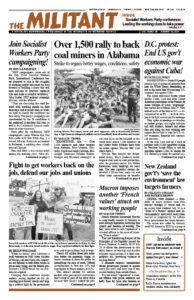OREWA, New Zealand — Hundreds of angry farmers rode their tractors through 55 towns and cities across New Zealand July 16 in a “Howl of a Protest” against new environmentally motivated restrictions enacted or proposed by the Labour Party government that target farmers.
The action was called by Groundswell NZ, formed in 2020 by a group of South Island farmers. They say the measures, pushed as necessary to protect rural waterways and land, fly in the face of farmers’ schedules and environmental measures already in place. “We know what it takes to get clean water and you don’t get it through unworkable regulations,” said Groundswell co-founder and dairy farmer Bryce McKenzie.
Some 300 farmers and supporters convoyed to this northern Auckland suburb July 16. At a muster in nearby Helensville, organizer Mick Smith launched the caravan with the words, “The last thing [the government] wants is a French-style protest.” He was referring to the “yellow vest” protests that swept small towns and rural areas across France 2018-19.
Many participants drove “utes,” rugged small utility trucks. A proposed new sales tax on such gas-powered vehicles led many to join the action, including some tradespeople for whom — like farmers — there is no “clean” electric alternative.
“Those who need them will just have to get them, and pay yet another tax,” Smith told the Militant.
The nationwide action drew both working and wealthier farmers, as well as market gardeners and orchard owners.
Another focus of the protest was government designation of big tracts of land as “Significant Natural Areas,” with new restrictions imposed on use of the land.
These areas include 48% of Maori land in the Far North District. After protests in June by both Maori and farmers, the government said it would “review” — but not end — the restrictions.
Farmers also expressed opposition to other government moves, including replacing large areas of productive farmland with pine tree plantings, motivated to offset carbon emissions. Farmers also face being taxed on their agricultural emissions beginning in 2025.
The caravan to Orewa displayed placards reading, “No farmers, no food.” Area farmers and small-town residents came out to cheer them.
Smith read a Groundswell statement at the rally here laying out farmers’ concerns. He rejected the anti-farmer stance of Climate Change Minister James Shaw, who is also co-leader of the Green Party. Shaw dismissed Groundswell as a “group of ‘pakeha’ [Caucasian] farmers” who fight “any kind of regulation about what they do to protect the environmental conditions on their land.”
Labour Prime Minister Jacinda Ardern was more circumspect, saying the government tries to work with farmers on “climate change” and other “challenges” to ensure “exports continue to fetch a high price.” Agriculture is the New Zealand capitalist economy’s biggest export earner.
Smith also pledged solidarity with workers such as nurses, doctors and teachers, “who have also been ignored by this government.”
The opposition National Party, which had seen its rural electoral base weakened in Labour’s 2020 landslide victory, mobilized its members of Parliament to attend the protests.
“If by Aug. 16 we have not seen sufficient moves by the government to address our concerns we will undertake further action,” Smith told the rally.

